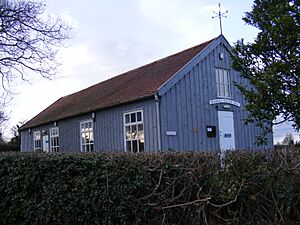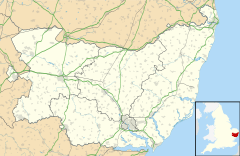Blaxhall facts for kids
Quick facts for kids Blaxhall |
|
|---|---|
 Blaxhall Village Hall |
|
| Population | 194 (2011) |
| District |
|
| Shire county | |
| Region | |
| Country | England |
| Sovereign state | United Kingdom |
| Post town | Woodbridge |
| Postcode district | IP12 |
| EU Parliament | East of England |
Blaxhall is a small village and civil parish in the East Suffolk area of England. It is located in the county of Suffolk. The village is about 8 miles (13 km) southwest of the towns of Leiston and Aldeburgh. In 2011, about 194 people lived in Blaxhall.
Contents
Discover Blaxhall Common
The local village council owns a special natural area called Blaxhall Common. This common is a Site of Special Scientific Interest (SSSI). This means it is a protected area because of its important wildlife and natural features.
A Protected Natural Space
Blaxhall Common is also part of the Suffolk Coast and Heaths Area of Outstanding Natural Beauty (AONB). This title means it is a beautiful landscape that is protected for everyone to enjoy. The common is one of the few remaining areas of "lowland dry heathland" in Suffolk. Heathland is a type of open land with small shrubs like heather. The Suffolk Wildlife Trust helps manage Blaxhall Common as a nature reserve. This helps protect the plants and animals that live there.
The Mystery of the Blaxhall Stone
There is a large stone in Blaxhall known as the Blaxhall Stone. It is located at Stone Farm. According to a local story, this stone has been growing bigger ever since it was first dug up in the 1800s.
Blaxhall in Books
Blaxhall village is the main topic of a book called Ask the Fellows who Cut the Hay. This book was written by the historian George Ewart Evans. It shares stories about what rural life was like in the village a long time ago.
Famous People from Blaxhall
Many interesting people have connections to Blaxhall.
Important Figures in History
- Thomas Weyland (around 1230–1298) was a lawyer and landowner. He became a very important judge, known as the Chief Justice of the Common Pleas, during the time of King Edward I.
- John Arnold (died around 1410) was a Member of Parliament (MP) for Ipswich. He served in Parliament several times in the late 1300s. He also held other important local jobs like Coroner and Bailiff.
- Robert Curson (1460–1535) was a courtier. This means he worked closely with kings and emperors. He served at the court of Henry VIII in England and also with Holy Roman Emperor Maximilian I.
- William Bullein (around 1515–1576) was a doctor and a church leader.
- George Ewart Evans (1909–1988) was a writer and a folklorist. He was born in Wales but spent time in Blaxhall. He collected and wrote down old stories and traditions from the countryside.
 | Jackie Robinson |
 | Jack Johnson |
 | Althea Gibson |
 | Arthur Ashe |
 | Muhammad Ali |


